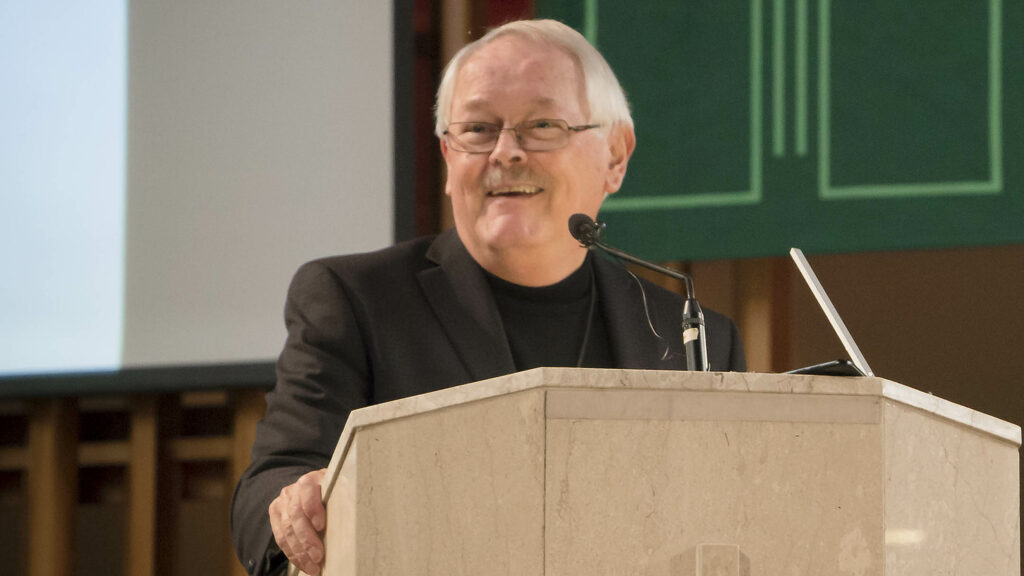The problem in the world and in the churches, Jim Wallis suggests, is that, perennially, conservatives get it wrong and liberals (over-reacting to conservatives) then don’t get it at all. Nowhere is this truer, I believe, than in how we discern the finger of God in the events of our lives.
Jesus tells us to discern the finger of God in our lives by reading the signs of the times. What’s meant by that? The idea isn’t so much that we look to every kind of social, political, and religious analysis to try to understand what’s going on in the world, but rather that we look at every event in our lives, personal or global, and ask ourselves: What’s God saying to me this event? What’s God saying to us in this event?
An older generation understood this as trying to attune itself to the workings of “divine providence”. That practice goes back to biblical times. When we read the bible, we see that for God’s people nothing happened that was understood as being purely secular or religiously neutral. Rather in every event, be it ever so accidental and secular, they saw the finger of God. For example, they believed that if they lost a war, it wasn’t because the other side had superior soldiers, but rather that God had somehow engineered this to teach them a lesson. Or if they were hit by drought it was because God had actively stopped the heavens from raining, again to teach them a lesson.
Now it’s easy to misunderstand this because, frequently, in writing this up, the sacred authors give the impression that God actively caused the event. That’s their wording, though not their intent or meaning. The bible does not intend to teach us that God causes wars or stops the heavens from raining; it accepts that they’re the result of natural contingency. The lesson is only that God speaks through them.
And it’s here where conservatives tend to get it wrong and liberals tend to miss the point. A recent example of this is the reaction of certain religious circles, conservative and liberal, to the outbreak of AIDS. When AIDS first broke out, a number of strong conservative religious voices spoke out saying that AIDS was God’s punishment on us for our sexual promiscuity, particularly for homosexuality. Liberal religious voices, for their part, were so turned off by this that their response was: God has nothing to do with this!
Both need a lesson on the workings of divine providence. Religious conservatives are wrong in their interpretation: God does not cause AIDS to punish us for sexual promiscuity. Conversely, religious liberals are also wrong in saying that this has nothing to do with God. God doesn’t cause AIDS (or any other disease) but God speaks through AIDS and every other disease. Our religious task is to discern the message. What’s God saying to us through this?
James Mackey teaches that divine providence is a conspiracy of accidents through which God speaks. Frederick Buechner teases this out a little further by saying: “This does not mean that God makes events happen to us which move us in certain directions like chessmen. Instead, events happen under their own steam as random as rain, which means that God is present in them not as their cause but as the one who even in the hardest and most hair-raising of them offers us the possibility of that new life and healing which I believe is what salvation is.”
God is always speaking to us in every event in our lives. For a Christian, there’s no such a thing as a purely secular experience. The event may be the result of purely secular and contingent forces but it contains a religious message for us, always. Our task is to read that message.
And one further note: Mostly, it seems that we hear God’s voice only in experiences that are deeply painful for us rather than in events that bring us joy and pleasure. But we shouldn’t misread this. It’s not that God speaks only through pain and is silent when things go right. Rather, in the words of C.S. Lewis, pain is God’s microphone to a deaf world. God is always speaking, mostly we aren’t listening. It’s only when our hearts start breaking that we begin to attune ourselves to the voice of God.
Divine providence is a conspiracy of accidents through which God speaks and we must be careful to get both parts of the equation right. God doesn’t cause AIDS, global warming, the refugee situation in the world, a cancer diagnosis, world hunger, hurricanes, tornadoes, or any other such thing in order to teach us a lesson; but something in all of these invites us to try to discern what God is saying through them. Likewise, God doesn’t cause your favorite sports team to win a championship; that too is the result of a conspiracy of accidents. But God speaks through all of these things – even your favorite team’s championship win!

